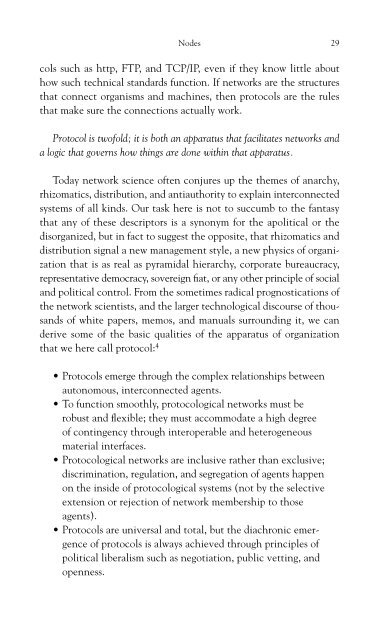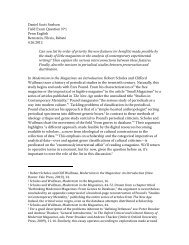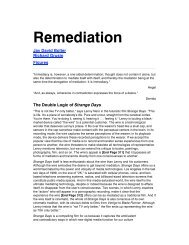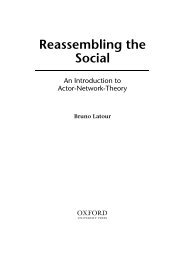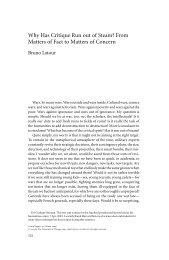The Exploit: A Theory of Networks - asounder
The Exploit: A Theory of Networks - asounder
The Exploit: A Theory of Networks - asounder
You also want an ePaper? Increase the reach of your titles
YUMPU automatically turns print PDFs into web optimized ePapers that Google loves.
Nodes 29<br />
cols such as http, FTP, and TCP/ IP, even if they know little about<br />
how such technical standards function. If networks are the structures<br />
that connect organisms and machines, then protocols are the rules<br />
that make sure the connections actually work.<br />
Protocol is tw<strong>of</strong>old; it is both an apparatus that facilitates networks and<br />
a logic that governs how things are done within that apparatus.<br />
Today network science <strong>of</strong>ten conjures up the themes <strong>of</strong> anarchy,<br />
rhizomatics, distribution, and antiauthority to explain interconnected<br />
systems <strong>of</strong> all kinds. Our task here is not to succumb to the fantasy<br />
that any <strong>of</strong> these descriptors is a synonym for the apolitical or the<br />
disorganized, but in fact to suggest the opposite, that rhizomatics and<br />
distribution signal a new management style, a new physics <strong>of</strong> organization<br />
that is as real as pyramidal hierarchy, corporate bureaucracy,<br />
representative democracy, sovereign fiat, or any other principle <strong>of</strong> social<br />
and political control. From the sometimes radical prognostications <strong>of</strong><br />
the network scientists, and the larger technological discourse <strong>of</strong> thousands<br />
<strong>of</strong> white papers, memos, and manuals surrounding it, we can<br />
derive some <strong>of</strong> the basic qualities <strong>of</strong> the apparatus <strong>of</strong> organization<br />
that we here call protocol: 4<br />
• Protocols emerge through the complex relationships between<br />
autonomous, interconnected agents.<br />
• To function smoothly, protocological networks must be<br />
robust and flexible; they must accommodate a high degree<br />
<strong>of</strong> contingency through interoperable and heterogeneous<br />
material interfaces.<br />
• Protocological networks are inclusive rather than exclusive;<br />
discrimination, regulation, and segregation <strong>of</strong> agents happen<br />
on the inside <strong>of</strong> protocological systems (not by the selective<br />
extension or rejection <strong>of</strong> network membership to those<br />
agents).<br />
• Protocols are universal and total, but the diachronic emer -<br />
gence <strong>of</strong> protocols is always achieved through principles <strong>of</strong><br />
political liberalism such as negotiation, public vetting, and<br />
openness.


